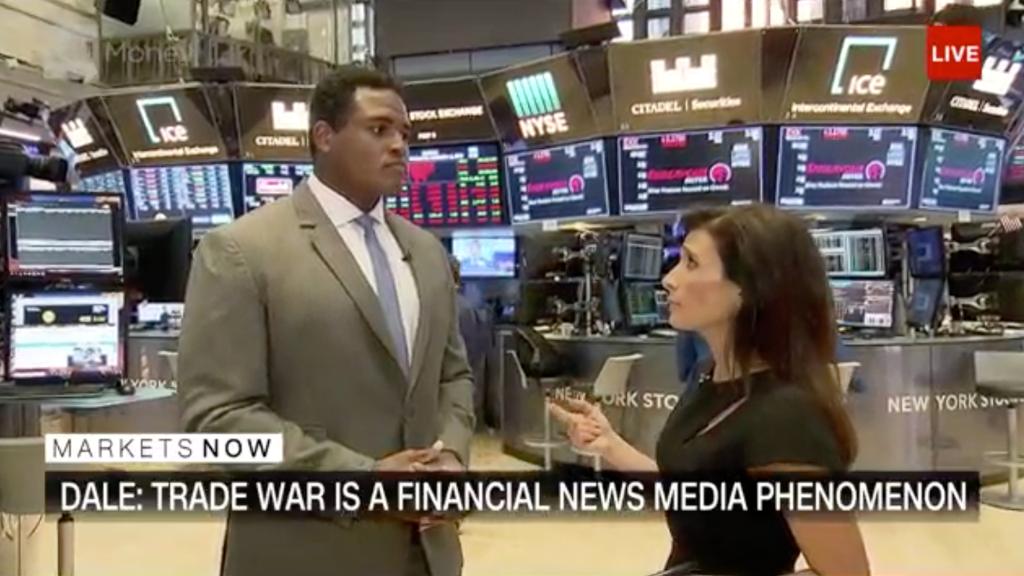
Wall Street doesn’t seem to care about the escalating trade war between the United States and China.
The Dow jumped 175 points and the Nasdaq climbed 1% on Tuesday despite Washington and Beijing pushing ahead with another round of punishing tariffs. Investors are betting the US economy will continue to power ahead of the rest of the world.
Yet beneath the surface, some are getting worried about the ability of the global economy to withstand the trade war and brewing storms in emerging markets.
One in four professional investors is bracing for global growth to slow over the next year, according to a Bank of America Merrill Lynch survey published on Tuesday. That’s the worst outlook in this monthly survey since December 2011 and up from August when just 7% of investors were pessimists.
And nearly half of investors surveyed by Bank of America believe the US economy will decelerate and rejoin the rest of the world.
Just one in three said that in August.
“Investors are holding on to more cash, telling us they are bearish growth,” Michael Hartnett, chief investment strategist at Bank of America Merrill Lynch, wrote to clients.
Not surprisingly, the trade war topped the worry list for the fourth straight month. The second-most popular “tail risk” is related: a slowdown in China’s economy.
The survey was conducted September 7-September 13, before President Donald Trump leveled a 10% tariff on $200 billion worth of imports from China AND Beijing said it will retaliate by putting tariffs on $60 billion worth of US imports at a rate of 5% to 10%.
“It certainly does seem that we’re approaching spiral stage,” Peter Boockvar, chief investment officer at Bleakley Advisory Group, wrote to clients on Tuesday.
Anne Van Praagh, a managing director at Moody’s, said that higher tariffs will “hurt the economy by distorting prices,” creating inefficiencies and having a chilling effect on investment decisions.
‘Black Swan’ gauge on the rise
Wall Street seemed to take the news in stride: the Dow climbed within 400 points of an all-time high, the first since January.
The VIX (VIX) volatility index, a measure of market turbulence, declined 7% to a very quiet level of 13. Recall that the so-called “fear gauge” shot up to 50 in February.
However, a lesser known barometer of investor worry is sending more ominous signals. The CBOE SKEW Index rises when option trades signal that concern about a “black swan” incident — an unexpected event that has a huge impact. The index is trading near the highest level since records began in 1990.
US markets have been bolstered by a strong domestic economy that can hopefully shrug off the trade tensions. The US unemployment rate is sitting at just 3.9%. America’s gross domestic product climbed at an annualized pace of 4.2% in the second quarter.
Despite the trade standoff, growth is on track to accelerate to 4.4% in the third quarter, according to a volatile forecasting model from the Atlanta Federal Reserve.
‘It’s going to be a mess’
The impact from proposed tariffs on GDP growth in the United States is likely to be “very modest,” Goldman Sachs chief economist Jan Hatzius wrote to clients on Tuesday.
Hatzius said that while there is a chance that Washington and Beijing reach a resolution, “further escalation seems likely” and the situation is “highly uncertain.”
Still, some prominent business leaders are starting to sound the alarm.
The Business Roundtable, a powerful lobby led by JPMorgan Chase (JPM) boss Jamie Dimon, issued a statement saying that “unilaterally imposing tariffs is the wrong way to achieve real reforms” and threatens “further harm to US businesses and workers.”
FedEx (FDX) CEO Fred Smith told analysts on Monday that the US-China trade fight is “worrisome to everyone” and may already be causing China’s economy to moderate.
Alibaba (BABA) founder Jack Ma warned the US-China trade war could last for 20 years. “It’s going to last long, it’s going to be a mess,” Ma said on Tuesday.
CNNMoney (New York) First published September 18, 2018: 1:56 PM ET





